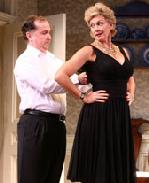SITE GUIDE
SEARCH
REVIEWS
FEATURES
NEWS
Etcetera and
Short Term Listings
LISTINGS
Broadway
Off-Broadway
NYC Restaurants
BOOKS and CDs
OTHER PLACES
Berkshires
London
California
DC
Philadelphia
Elsewhere
QUOTES
On TKTS
PLAYWRIGHTS' ALBUMS
LETTERS TO EDITOR
FILM
LINKS
MISCELLANEOUS
Free Updates
Masthead
Writing for Us
A CurtainUp Review
Losing Louie
By Elyse Sommer

Mark Linn-Baker and Michele Pawk Losing Louie
(Photo: Joan Marcus) |
In fairness to Mr. Mendes da Costa, many in the matinee audience at MTC's elegant Biltmore Theater roared appreciatively at the humor which ranges from sight gags to having the characters standing around telling lawyer and priest jokes and winding up with an excruciatingly unfunny buddy exchange about the pros and cons of being circumcised. The plot does indeed have an Ayckbournish setup: The story of three of the characters segues between the early 1960s and the present and play out simultaneously in the same chintz-decorated bedroom of a Westchester house with the reunion of their estranged middle-aged sons and their spouses.
For about ten minutes it's fun and funny to see who's going to emerge from one of the two doors at each side of the stage. Actually, the first entrance is made not through the door but with Louie Ellis (Scott Cohen) and Bella Holland (Jama Williamson), a law student and live-in baby sitter with whom he's having a passionate affair, emerging from beneath the headboard matching quilt. The cause for that coitus interruptus which sends Louie and Bella scurrying into their clothes is actually one of the play's better sight gags — a toy fire truck belonging to Louie's six-year-old son Tony who's been hiding beneath the bed.
It should come as no surprise that young Tony's curiosity has an effect on this suburban triangle and that the grown-up Tony (Mark Linn-Baker), one of the four characters of the present-day continuation of that earlier domestic drama, is not particularly well-adjusted. The occasion for his return to sburban Pound Ridge is his father's funeral which also prompts the title. As my British colleague categorized and summed it all up when it was still called Losing Louis (see link below), this belongs to the" Families-Exist-To-Make-Psychoanalysts-Rich school of tragic-comedy. We're never sure if we're in the icy wastes of Strindbergia or cosy sit-com suburbia. It is possible to blend the two genres, but this play doesn't pull it off but lumbers to an inconclusive halt rather than a conclusion." (The same scene, two generation time traveling was effectively handled without the comedy in Richard Greenberg's Three Days of Rain).
On its way towards that unsatisfying conclusion, we watch Louie caught between the lovely Jewish Bella and his very pregnant Shiksa wife Bobbie (Rebecca Creskoff) and see the disastrous results of this marital triangle bought up to date after his death in that same marital bed. Curious little Tony is now a grumpy fifty-year-old, not very happily married to the blowsy Sheila (Michele Pawk)-- you guessed it, another Shiksa, awaiting the arrival of his more successful kid brother Reggie (Matthew Arkin) also married to a nonJew, albeit a slim glamour girl named Elizabeth (Patricia Kalember) -- and, you guessed it again, just as mixed up. The uneasy reunion lays bare all the causes for the sibling squabbling (Besides Reggie's having a classier car and wife, he has fathered two achieving children whereas Tony's only offspring suffers from some vague mental disability). After much squabbling and liquor consumption and the predictable funeral mishaps, Louie's will is read, long anticipated secrets are revealed and the couples part on a note of moderate sibling bonding.
Whether Louis or Louie, Brian Clover's less than enthralled take on the pre-Americanized version of this two hours of see-sawing from sitcom to sudsy melodrama back to sitcom, makes this a losing proposition. Robin Lefevre, who directed the British premiere certainly can't be blamed for preferring to let director Jerry Zaks try to bring these carricature dysfunctionals to life at the Biltmore and instead lending his talent to that blue ribbon wit George Bernard Shaw whose Heartbreak House is currently being revived by the Roundabout (our review). As Lefevre did in London, Zaks has assembled a top tier cast and production team.
John Lee Beatty's set is appropriately upscale suburban and with the doors to accommodate the farcical entrances, exits and eavesdropping. William Ivey Long's costumes make it easy to immediately differentiate the 60s and present day characters. The actors do their utmost to bring the right mix of humor and pathos to their characters and it is they rather than their characters who deserve our condolences for being trapped in these thankless roles.
As for Manhattan Theater Club, an occasional loser like this should not negate a history of fine new plays like Doubt, Shining City and Rabbit Hole — or superior revivals of which the upcoming production of Brian Friel's Translations promises to be an example. To read our review of the London production of this play go here.
| LOSING LOUIE Playwright: Simon Mendes da Costa Director: Jerry Zaks Cast: Matthew Arkin (Reggie Ellis), Scott Cohen (Louie Ellis), Rebecca Creskoff (Bobbie Ellis), Patricia Kalember (Elizabeth Ellis), Mark Linn-Baker (Tony Ellis), Michele Pawk (Sheila Ellis) and Jama Williamson (Bella Holland). Sets: John Lee Beatty Costumes: William Ivey Long; Lights: Paul Gallo Sound: Dan Moses Schreier Running Time: 2 hours, 15 minutes, includes an intermission Manhattan Theater Club, Biltmore Theater, 261 West 47th Street, Manhattan; (212) 239-6200 From 9/21/0 to 11/26/06; opening 10/12/06. Tue to Sat at 8pm; Sat & Sun at 2pm; Sun at 7pm. Tickets: $56.25 - $86.25. Reviewed by Elyse Sommer based on October 14th matinee performance |

Easy-on-the budget super gift for yourself and your musical loving friends. Tons of gorgeous pictures.

Leonard Maltin's 2007 Movie Guide

At This Theater
Leonard Maltin's 2005 Movie Guide

 >
>

